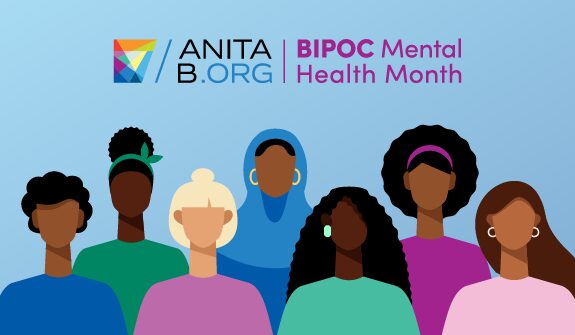Read time: 3 min
July is BIPOC Mental Health Month, an opportunity to focus on the unique mental health challenges and needs of historically oppressed groups. Rooted in America’s colonialist history, Black, Indigenous, and other People of Color experience disproportionate amounts of discrimination, oppression, inequity, and trauma, resulting in a greater likelihood of developing mental health conditions, while facing higher barriers to treatment.
BIPOC Mental Health in Tech
In our 2022 Technical Equity Experience Survey (TechEES), 79.9% of Black, Latinx, Native American, and Pacific Islander women technologists collectively, reported experiencing racial and/or ethnic discrimination. TechEES also reports that overall, 77.4% of all Black, Latinx, Native American and Pacific Islander women technologists are experiencing burnout, a significant predictor of many physical and psychological problems. Companies should focus on increasing psychological safety for their entire workforce to support mental health.
Barriers to Help
Yet, barriers such as lack of insurance, lack of providers from diverse racial/ethnic backgrounds, distrust of the health care system, and stigma associated with mental illness, prevent communities of color from getting the support they need and deserve. In fact, only one-in-three African American adults who need mental health care receive it.
Organizations Supporting BIPOC Mental Health
Luckily, there are organizations out there combatting this inequity and supporting mental health for historically oppressed communities. From mentorship and mental health-focused membership events at AnitaB.org, to organizations focused specifically on matching People of color with mental health professionals, we’ve outlined a few great organizations to follow and support:
- Eating disorder healing is hard, getting treatment shouldn’t be. Project Heal opens doors to healing for those the system fails by breaking down systemic, healthcare, and financial barriers that millions of people in the U.S. face when trying to heal from their eating disorder.
- Imagine a world where there are no barriers to Black healing. BEAM is a national training, movement building, and grant making institution that is dedicated to the healing, wellness, and liberation of Black and marginalized communities.
- Mental Health Coalition is working together to end the devastating stigma surrounding today’s most prevalent public health crisis. Mental Health Coalition is made up of passionate and influential organizations, brands, and individuals who have joined forces to end the stigma surrounding mental health and to change the way people talk about, and care for, mental illness.
- Dr. Jennifer Mullan, a clinical psychologist, established Decolonizing Therapy—a transformative social movement in the field of mental health with the primary objective to ensure that individuals, particularly queer BIPOC communities, gain equitable access to resources that recognize the enduring effects of racism and the profound impact of multigenerational trauma. In addition to individual and group mental health coaching, Dr. Mullan offers various other resources for those interested in Decolonizing Therapy.
- NQTTCN sits at the intersection of the mental health field
and movements for social justice. The National Queer and Trans Therapists of Color Network (NQTTCN) is a healing justice organization committed to transforming mental health for queer and trans people of color (QTPoC). NQTTCN sits at the intersection of movements for social justice and the field of mental health to integrate healing justice into both of these spaces. Our overall goal is to increase access to healing justice resources for QTPoC.
- We Are Native is a comprehensive health resource for Native youth, by Native youth, providing content and stories about the topics that matter most to them. We Are Native strives to promote holistic health and positive growth in their local communities and the nation at large.
Other helpful links:
Read more posts from the thread A Call for Change: Why Supporting Black Women-Led Nonprofit Organizations is Crucial

